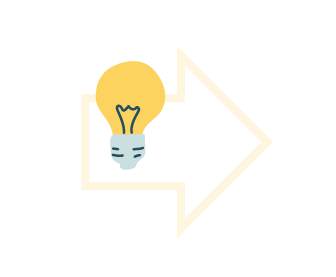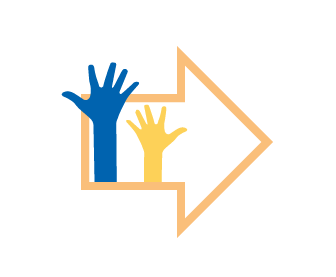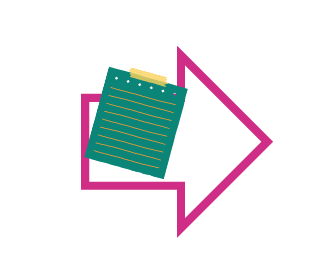- Do you have a research study in mind that you would like to learn more about? We can forward you with detailed information and put you in touch with the study teams, helping you decide if your school would like to take part!
- Still interested? We can help obtain the necessary local approvals and permissions from authorities.
- Once approvals are in place, the criteria for young people's involvement will be shared with the school. The school will then invite those who meet the criteria to volunteer, with assistance from school staff and/or the research team. Participant information sheets will be provided to pupils or their parents or guardians. They are given plenty of time to decide whether they wish to participate voluntarily.
Health & Social Care Research Across North East & North Cumbria.
Research in Schools
Research in schools
Are you a teacher or school representative interested in getting involved in educational research?
Hear why research is so important in schools.
Explore our tips and resources to help you get started.
1 Why is research important for schools?
Schools, teachers and students can benefit from participating in health and care research in many different ways.
Empowering Schools: How Health Research Can Benefit Students and Educators
Video duration: 4 minutes 45 seconds
Listen to Dr Dave McPartlan, an education advisor, as he shares insights on how engaging in research benefits schools, educators and young people:
00:32 Why Get involved?
01:25 Benefits for Students
02:26 Curriculum Integration
02:58 Support from NIHR
03:37 How to Get Involved
Quantitative research
supports the curriculum in classrooms

Example 1. Mathematics: Using research data can support the teaching of statistics in maths in many ways including how the use of research statistics can measure the validity of findings.
Example 2. History: By using research data in History lessons, variables over time can be explored, such as the reduction of diseases through history.
Qualitative research
fosters personal growth in young people

Engaging in research activities and conversations benefits young people in a number of ways:
- Confidence boosting
- Improved trust and relationships with adults
- Empowerment and inspiration
- Critical thinking skills
- Socio-emotional development
- Communication and research skills
2 How can schools get involved in research?
What does research look like in schools?
There are three ways in which research in schools can be conducted. It could be a quantitative, qualitative or mixed-method study, each bringing its own set of benefits to schools and their young people.
Examples of Health Research Questions in Schools
Quantitative research
“What impact does a classroom size, have on academic performance?”
“Does providing weekly lessons on mental health, reduce the incidences of mental health self-referral in schools?”
Qualitative research
“An exploration of young people’s views on school mental health support”
“Understanding how interventions can tackle LGBTQ+ equality in schools”
5-Step Process for Conducting Research in Schools
- Providing informed consent involves clearly outlining the purpose, procedures, risks and benefits of the study. Participants will be asked to complete an informed consent form. Anyone who signs the consent form can withdraw at any time!
Data collection is the process of gathering information. Data can be collected in the following ways:
- Quantitative research: This involves the gathering of numerical data, typically from a large number of participants. It is often collected through questionnaires and surveys that use yes/no answers and ranking scales.
- Qualitative research: This method gathers rich and descriptive information and typically involves a smaller number of participants. School staff and research teams can collaborate to develop approaches that enable the conduct of focus groups, interviews, or even allow researchers to observe in classrooms.
Data analysis is the process of obtaining new information and converting them into useful insights for gathering evidence and making decisions.
-
In Quantitative research, statistical methods are used to describe, compare and summarise the numerical data collected.
-
In Qualitative research, the information gathered can provide a rich understanding of children’s experiences and emotions.
- Research findings are presented to the school in a user-friendly format. If there are young people working as co-researchers, they may well be involved in the dissemination process as well.
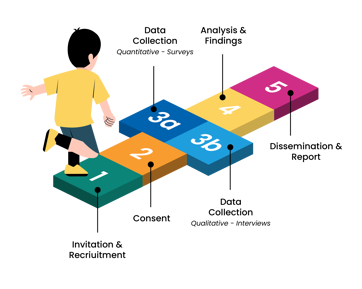
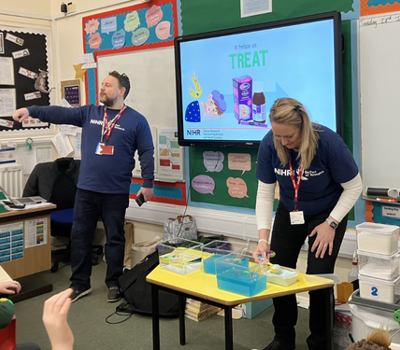
Inspiring young minds on health research
School visit to St. Joseph’s Catholic Infant and Junior Schools in Birtley for Careers Week
Dan Duhrin and Caroline Fletcher from the NIHR North East and North Cumbria Regional Research Delivery Network (NIHR NENC RRDN) visited St. Joseph’s Catholic Infant and Junior Schools in Birtley as part of the school's Careers Week. They provided research workshops aimed at inspiring students ranging from 4-year-olds in Reception class to 11-year-olds in Year 6.
3 Getting started
Check out the resources below and get involved now.
Download Our Resource Pack
Bringing research into the classroom
This resource pack is designed to help pupils in Key Stage 2 and their teachers explore the importance and process of research by taking part in a simple research study.
- Designed for a group of up to 40 Key Stage 2 pupils
- Take approximately one hour to complete
Please note, this Key Stage 2 pack is a pilot resource which can be easily enhanced and adapted for other Key Stages, please let us know what you think of it, and whether you would be keen to see more tailored resources.

The resource pack includes:
- 40 activity character cards
- Slide deck as a guide for teachers to implement the activity in their classrooms
- Additional background information

Useful resources
Use the filters below to find useful resources
Available studies
Coming soon
4 4. We value your feedback
Please share your thoughts about this new Research in Schools site in this three-question survey. Your feedback will help shape the next stage of its development.
Was this page useful?
Add your feedback
There was an error submitting your feedback, please try again.
Thanks for your feedback, this will help our team improve your experience on the website





